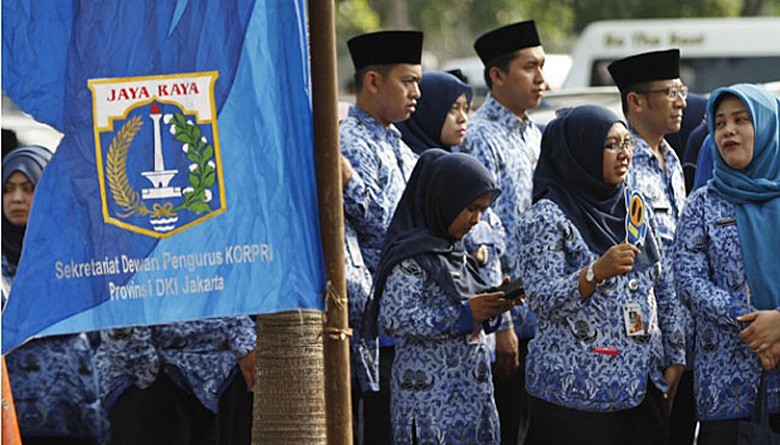Popular Reads
Top Results
Can't find what you're looking for?
View all search resultsPopular Reads
Top Results
Can't find what you're looking for?
View all search resultsIndonesia seen to have 1 million excess civil servants
President Joko “Jokowi” Widodo has defended the government’s decision to reduce the number of civil servants to improve the efficiency of government spending, a large chunk of which goes toward salaries and allowances.
Change text size
Gift Premium Articles
to Anyone
President Joko “Jokowi” Widodo has defended the government’s decision to reduce the number of civil servants to improve the efficiency of government spending, a large chunk of which goes toward salaries and allowances.
The President said reducing civil service staff, which had been proposed by the Administrative and Bureaucratic Reform Ministry, would happen in stages.
“We want our civil servant spending to be more efficient,” Jokowi said in Jakarta on Tuesday.
Administrative and Bureaucratic Reform Minister Yuddy Chrisnandi explained that currently, spending on civil servants accounted for 33.8 percent of the total budget. He said his ministry was concerned that if the government continued to recruit civil servants, there would be a ‘budget explosion’, as had occurred in Greece.
"We do not want the Indonesian government to be burdened with such large civil servant spending since our development [agenda] now emphasizes capital expenditure," Yuddy said, adding that the ministry had conducted a simulation on its public service downsizing policy.
The minister said Indonesia had 1 million excess civil servants, because the ideal number of civil servants in the country was about 1.5 percent of the total population, or about 3.5 million people. Currently, Indonesia had 4.5 million civil servants, he said.
"We aim to reduce this figure through rationalization and redistribution policies, as suggested by the Vice President [Jusuf Kalla]. The President noted that the policy would not be executed in a drastic way, especially during an economic situation like this," Yuddy said.
He said the ministry proposed to carry out the rationalization policy over three years, from 2017 through 2019. If 200,000 civil servants retired every year, he said, the number of civil servants would decline to around 4 million people in the next three years.
Yuddy further said the ministry would also assess civil servants across the country to see whether they were qualified for their jobs, taking into account their work performance.
"We will determine a standard mechanism to assess them, with the unproductive or incompetent civil servants being offered early retirement," he said.
Despite the downsizing policy, Yuddy said, the government would continue to recruit new civil servants, especially in the areas of education, health, infrastructure, food and law enforcement.
"The number of civil servants to be recruited will not be as great as in [the past], because in the long run, the number of our civil servants should be in line with the ratio of 1.5 percent of the total population," he said. (ebf)










